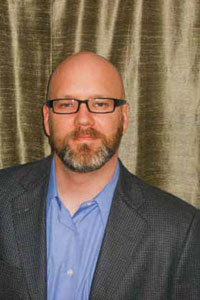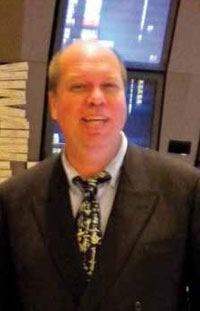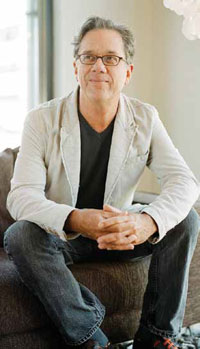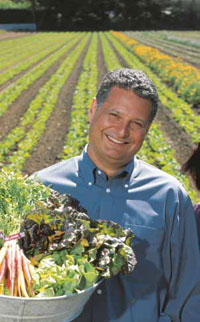Over the decades, UCSC has spawned a number of innovators with the help of a world-class faculty and an emphasis on an interdisciplinary education that gives students space to follow their muses.
And eight years after the university created Silicon Valley Initiatives, a true culture of entrepreneurial spirit has gripped the campus—thanks to an intentional focus on innovation, a growing crop of young entrepreneurs, and the stewardship of Silicon Valley veterans.
“It’s an opportune time to build our network and form the alliances that will really help boost our reputation and presence in the Valley,” said Gordon Ringold, head of Silicon Valley Initiatives, a set of educational and research activities that increase the presence of UC in Silicon Valley. “There’s a lot of intellectual capital we can tap into to bolster our resources in a challenged economic environment.”
Ringold, who earned his bachelor’s in biology from UCSC in 1972, became director last summer. A former professor at Stanford University, he has started a handful of companies in genetics and biofuels, including Codexis, which manipulates enzymes to improve the conversion of sugar cane into fuel. It’s based on technology— also created by a Ringold company—used to heighten drug performance.
For Silicon Valley Initiatives, Ringold is focused on the big industries on the peninsula and the South Bay: computer science, computer engineering, and material sciences. Of course, if Silicon Valley Initiatives is to be a nexus of innovation between the Valley and the campus, there has to be something to connect.
Enter the Center for Entrepreneurship, a campus outfit born last fall and, just as important, a growing cadre of UCSC grads gaining influence in Silicon Valley, the Bay Area, and beyond.
“The cohort of UC Santa Cruz alums who are entrepreneurs in the Valley has really started to grow,” Ringold said. “Because of that, we can tap into a network that even five or 10 years ago would have been harder to accomplish. There aren’t many of us who have been around for a long time.”
But alumni with fewer gray hairs than Ringold are making names for themselves in a broad array of fields, everything from farming to pharmaceutical to bikes and Internet mapping.
We feature four of them:
Brandon Allgood and Nigel Duffy, Numerate
Brandon Allgood and Nigel Duffy radiate confidence. According to Allgood, who earned a master’s degree in physics from UCSC in 2001 and a Ph.D. in 2005, their use of the cloud—a network of computers linked in cyberspace—is “a fundamental paradigm shift” in pharmaceutical design.
In traditional drug development, researchers make incremental changes to chemical compounds and wait to see if the effects are good, bad, or indifferent.
Numerate, based in San Mateo, uses a network of up to 2,000 computers to conduct simultaneous virtual screenings of chemical combinations to find what works, much faster and cheaper than the old ways, the company says.
“We’ve solved the problem of getting a computer to design a small molecule,” said Duffy, who obtained his doctorate in computer science in 2001 at UCSC. “We partner with people with insight into what a therapeutic should do to treat a disease, and we deliver to them molecules that implement their biological insight.”
Allgood and Duffy work with some big pharmaceutical companies they can’t name publicly and universities including Stanford and Cornell. They’re excited at the prospect of more technology licensing and development at UCSC, and Allgood will use his new position on the UC Santa Cruz Foundation board to fan the entrepreneurial flames.
“There’s an overall creativity you find at UCSC you don’t find at other places,” he said. “It lends itself to thinking outside the box, which is an absolute necessity for an innovator.”
Bernt Wahl, Factle
Anyone who’s ever obsessed over ZIP code prestige has a friend in Bernt Wahl. So do real estate agents.
Wahl (Crown ‘86, mathematics and physics) lives in Berkeley and teaches entrepreneurship to engineers at UC Berkeley. He’s also CEO of Factle, which specializes in hyperlocal mapping and location intelligence.
“I was involved in search engines,” Wahl said by way of explaining the germination of Factle and his failed attempt to take over the former search engine Infoseek. “I noticed that things were getting more hyperlocal. I consulted with a real estate company, breaking down regions into smaller units.
“The cities were fine, but nobody had aggregated the neighborhood boundary data. We pioneered it.”
Center cultivates innovation to propagate home-grown businesses
A focused academic program to incubate business and technology development, and technology licensing to attract cash and prestige to the campus. Read more.
Factle’s technology allows searches so granular they take a lot of guesswork, and legwork, out of the home-buying process. For example, a house hunter who loses out on a home in a particular San Francisco neighborhood can get an e-mail alert the moment another house in the same area goes on the market. The technology is malleable enough to do foreclosure or public health analysis, and track damages and repairs house by house after a catastrophe like last summer’s San Bruno pipeline explosion or the March earthquake and tsunami in Japan.
How valuable can Wahl be to UCSC’s efforts to promote innovation on campus? Well, earlier this year he was one of 350 entrepreneurs from around the world invited to an event at the United Nations in New York, and he scored an invite to dinner with the Rockefellers along with his college buddies, one of whom created a search algorithm Microsoft bought and named Bing.
“It was pretty interesting,” he said of the dinner. “I learned that the pool room isn’t the billiards room. It actually has a pool in it.”
Rob Forbes, PUBLIC
Already known for starting Design Within Reach, the avant-garde-gonemainstream furniture store launched as a web-direct business in 1999, Rob Forbes now has “a mission to bring the same level of intensity, education, and value to our public spaces and cities as DWR has brought to our personal and private environments.”
As the web site for his urban bike design company PUBLIC makes clear, the people at the company don’t hate cars—they just want bikes to overtake cars as the preferred American way of getting around.
They aim to take back public spaces with bikes affordable enough to fit middle-class budgets and cool enough to be used on the Google and Apple campuses. It’s exactly the kind of company that would be operated by someone who graduated with a degree in aesthetic studies from Porter College (1974). And to hear Forbes tell it, every bike he sells is a consumer good and a purchase for the public good.
“We believe the quality and usage of our public spaces is the measure of the success of our democracy,” he said.
Drew Goodman, Earthbound Farm
Drew Goodman and his wife Myra didn’t start Earthbound Farm in Carmel Valley on a whim, but it was close.
“We started the farm based on the romantic notion of living on a farm,” the New York City native said. “That it would be fun before we got on with our career thing. We ended up staying and pursuing it.”
And a little raspberry patch they tended in exchange for free rent is now the second-biggest organic vegetable brand in the country. It’s a development Goodman (College Eight ‘83, environmental studies and environmental design) attributes to their innate tenacity and the values he absorbed on the UCSC campus.
“As an entrepreneur, you need to think through where you’re going, but at some point you need to take the plunge and know you’re going to be able to navigate,” he said. “For those with the appetite, it’s fall down seven times and pick yourself up eight. You have to feel like you’re going to figure it out.”
And as UCSC evolves into an entrepreneurminded institution, Goodman thinks it’s the logical leader of “do good and do well” business.
“There’s a great opportunity for entrepreneurs to finance businesses that can help push us to a more sustainable way of doing things and making money in the process,” Goodman said. “It would be nice to see UCSC take the lead in that.”
Matt King is a freelance writer based in San Jose.






